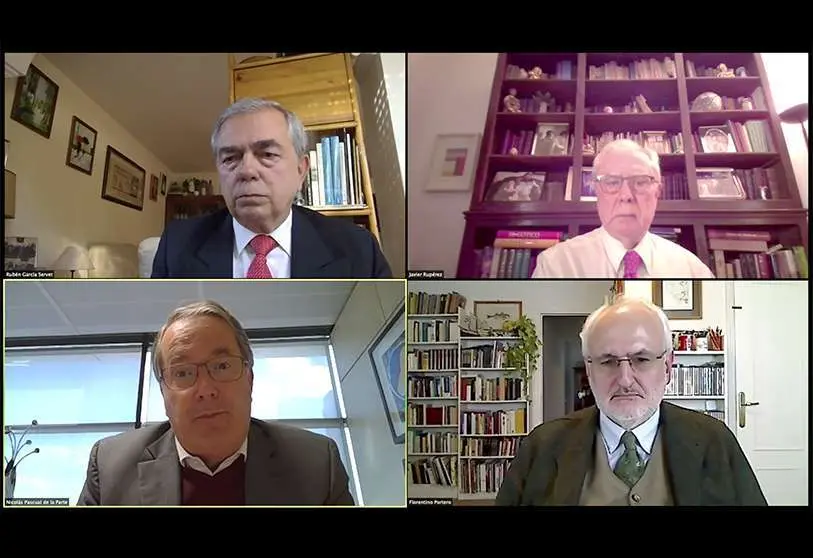"Communicating in terms of defence does not give votes, but it can take them away", Florentino Portero

The absence of defence issues in the political debate in Spain is something that is striking, comparing it to the countries around us. They spoke about this issue at the seminar organised by the FAES Foundation.
The Spanish and the culture of defence: perceptions, needs and emergencies', the director of the International Policy Institute of the Francisco de Vitoria University, Florentino Portero; Air Force Lieutenant General (reserve) Rubén García Servert and the diplomat and former Spanish ambassador to NATO, Nicolás Pascual de la Parte. The webminar, as is usual in times of pandemic, was moderated by the diplomat, former ambassador of Spain to Washington, NATO, CSCE and former UN Under-Secretary-General Javier Rupérez.
Political parties often exclude any reference to the armed forces or defence from their programmes because they assume that this is not a major concern of their voters. All this needs to be adapted by both society and state institutions.
Professor Portero stressed this point and referred to two approaches when talking about defence: one sociological and the other political.
The first of these talks about how Spaniards perceive defence as a whole, and does not come very close to reality. "Ordinary Spanish equates defence with the military. The military man is a well-trained person where the fears of yesteryear in the dictatorship or in the transition no longer exist; now the military man is a guarantor of the constitutional order, of the legal order".
In Portero's view, the problem has been the lack of good communication between the directorates-general of the Ministry of Defence to discuss issues relating to security and defence. Although, as the lecturer explains, the Institute of Strategic Studies and the Real Instituto el Cano have done a great deal of work to reach students, particularly those interested in international relations, with very valuable knowledge of defence and security, it has remained there, in the academic sphere.
"Outside the academic field the impact of defence has been very limited. Out of fear, due to political risks, citizens have not formed a clear opinion regarding defence", Portero claims. "No one has bothered to have a defence strategy," said Pascual de la Parte.
The former Spanish ambassador to NATO sees the need to create a connection between Spain's interests and citizens in matters of security policies, and could begin by considering the debate on rights and freedoms. "Human rights and fundamental individual and collective freedoms must be defended against internal and external enemies, and citizens must be aware of this. It is not possible to enjoy rights and freedoms without protection and defence".
For this reason, Pascual de la Parte considers it necessary to promote security and defence as a category of public good on an international level.
Garcia Servet's argument has turned on the same line when he speaks of the lack of education in security matters on the part of citizens. "Fifty percent of Spaniards, according to the CIS, will not defend their country in an emergency situation. This makes Spain a country of slaves".
The problem, according to the Lieutenant General, is one of "a culture of citizenship and responsibility", which makes citizens free to live in a state of law.
Therefore, a possible return of compulsory military service (commonly known as the Mili) has emerged from the debate. Although it seems impossible, it could be used in other ways in courses at schools or colleges to bring students closer to what defence is, what good security means and what the role of the armed forces is, beyond the uniform.








